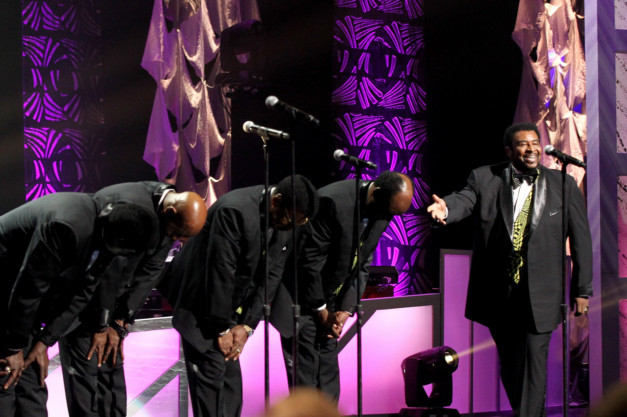
Dennis Edwards, who became a lead singer of the Motown hitmakers the Temptations in 1968 as they embraced psychedelic funk and won Grammy Awards for the songs Papa Was a Rollin’ Stone and Cloud Nine, died on Thursday in Chicago. He was 74.
His death, in a hospital, was confirmed on Friday by Rosiland Triche Roberts, one of his booking agents. She did not specify the cause.
Edwards’ resonant, powerful voice, burnished from years singing gospel, was perfect for the driving soul music of the 1970s.
“Marvin Gaye was a friend of mine, and he used to say, ‘Man, I wish I could sing like you, if I could have that growl in my voice,’” Edwards told The Tallahassee Democrat in 2013. “And I said, ‘Man, are you kidding me? I want to sing like you. Everybody wants to sing like you.’”
MOTOWN MUSIC
Before joining the Temptations, Edwards sang with another Motown group, the Contours, best known for their 1962 hit Do You Love Me (recorded before he joined them). The Contours opened for the Temptations in the late 1960s, and when Temptations’ lead singer David Ruffin left the group in 1968, he was asked to take over.
Ruffin told him personally that he was going to get the job, showing up at his house very early in the morning, Edwards said. “I thought he was kidding,” he said.
But at his first show with the Temptations, and some later ones, he recalled, Ruffin showed up, leapt onstage and took the microphone from him to sing some of his older hits. In time he left Edwards alone.
Edwards joined the Temptations just as the group, under the direction of the producer and songwriter Norman Whitfield, was developing a grittier sound, one largely influenced by the psychedelic soul of Sly & the Family Stone and very different from their earlier songs, like My Girl and Ain’t Too Proud to Beg.
The other members of the group — Eddie Kendricks, Otis Williams, Melvin Franklin and Paul Williams — also sang lead, notably Kendricks. But Edwards was an essential part of the group’s new sound on songs like I Can’t Get Next to You, Ball of Confusion (That’s What the World Is Today) and Shakey Ground.
Shortly after Edwards joined the group, the Temptations won their first Grammy, for the propulsive, upbeat Cloud Nine (1968); they won another for the funk anthem Papa Was a Rollin’ Stone (1971). That song, like two other Temptations hits from that period — I Can’t Get Next to You and Just My Imagination (on which Kendricks sang lead) — reached No .1 on the Billboard pop singles chart.
The group received a lifetime achievement Grammy in 2013.
SOLO CAREER
Edwards left the Temptations in 1977 to pursue a solo career but rejoined them some years later. In 1989, he was inducted into the Rock & Roll Hall of Fame, along with the five members from the Temptations’ mid-1960s heyday.
Edwards was born to a preacher in Fairfield, Alabama, on February 3, 1943, and grew up in Detroit. As a teenager he sang in a gospel group and studied music at the Detroit Conservatory of Music before signing with Motown in the late 1960s.
After parting ways with the Temptations, Edwards remained with Motown as a solo artist. In 1984 he had an R’n’B hit with Don’t Look Any Further, a duet with Siedah Garrett, which was later sampled for records featuring rappers like Rakim and Tupac Shakur.
In the 1990s, he toured with a group billed as Dennis Edwards and the Temptations, which led to a legal battle with Otis Williams about the use of the Temptations name. He settled by touring as the Temptations Review featuring Dennis Edwards.
Edwards’ marriage to Ruth Pointer, one of the Pointer Sisters, ended in divorce. His survivors include his wife, Brenda, with whom he lived in St. Louis; five daughters, Issa Pointer, Maya Peacock, Denise Edwards, Alison Turner and Erika Thomas; a son, Bernard Hubbard; and grandchildren.












